National Indigenous Peoples Day: 10 Ways to Celebrate
Every June 21st, thousands of Indigenous Peoples celebrate National Indigenous Peoples Day (NIPD). This is a special day to acknowledge the unique...
8 min read
Bob Joseph June 05, 2017
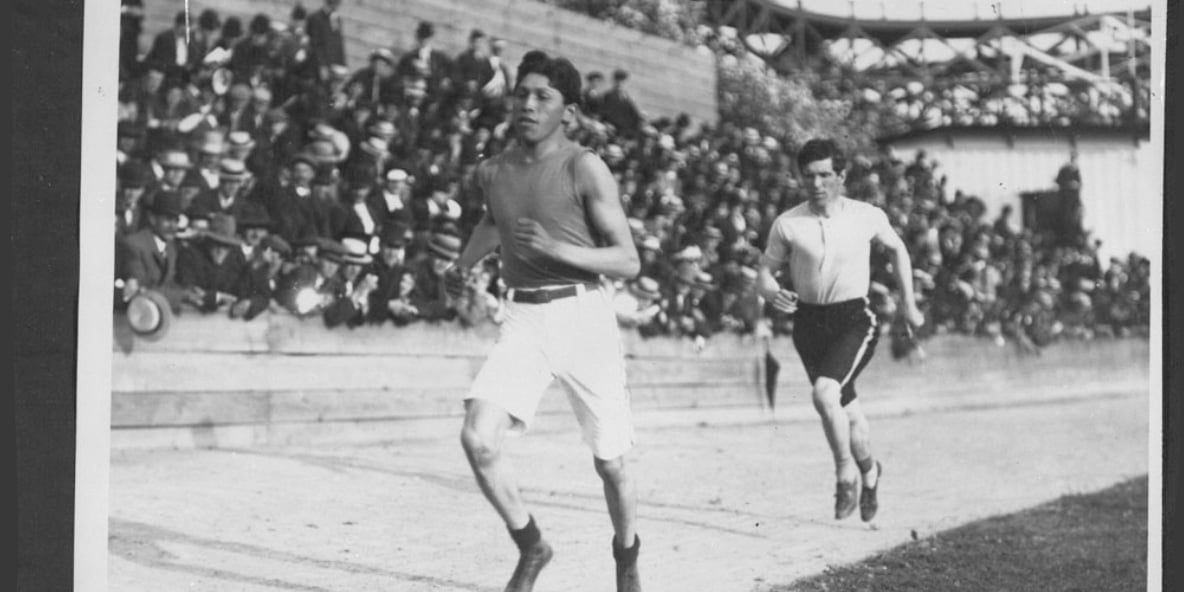
To celebrate National Indigenous Peoples Day on June 21 we have compiled a list of 21+ important Indigenous people from all walks of life. It is a random list of inspirational Indigenous leaders, artists, activists, journalists, veterans, musicians, comedians, authors, documentarians, athletes and “just plain folk” whose determination, and commitment to their passion and beliefs have, and continue to, improve Canada’s culture and social wellness. This is by no means a complete list - that would take a lifetime to compile - it is however a compilation of names that should, in this era of reconciliation, be familiar household names.
Here's an article that poses the question: National Aboriginal Day or National Indigenous Day?
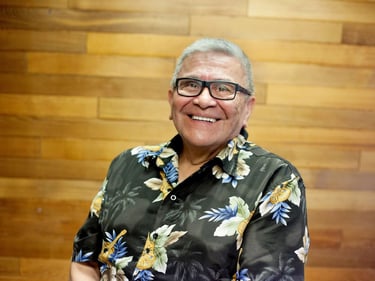 Chief Doctor Robert Joseph, O. B. C., is a hereditary chief of the Gwawaenuk First Nation who upholds a life dedicated to bridging the differences brought about by intolerance, lack of understanding, and racism at home and abroad. He is the
Chief Doctor Robert Joseph, O. B. C., is a hereditary chief of the Gwawaenuk First Nation who upholds a life dedicated to bridging the differences brought about by intolerance, lack of understanding, and racism at home and abroad. He is the
Ambassador for Reconciliation Canada, and a member of the National Assembly of First Nations Elders Council, was awarded the Order of British Columbia in 2015, and recipient of Indspire’s Lifetime Achievement award in 2016.
As a sixteen-year-old Rinelle Harper was sexually assaulted and viciously beaten and left to die on the banks of the Assiniboine River in 2014. She returned to school within two weeks of the attack, and five months after the attack, Ms. Harper, with an eagle feather in hand, stood before the Assembly of First Nations Special Chiefs Assembly and called for an inquiry into Canada’s missing and murdered Indigenous women and girls. Ms. Harper shared her story of survival with 16,000 youth attendees at Winnipeg’s WE Day celebrations.
“Alanis Obomsawin, OC, GOQ, filmmaker, singer, artist, storyteller. One of Canada’s most distinguished documentary filmmakers, Alanis Obomsawin began her career as a professional singer and storyteller before joining the National Film Board of Canada (NFB) in 1967. Her award-winning films address the struggles of Indigenous peoples in Canada from their perspective, giving prominence to voices that have long fallen on deaf ears. An Officer of the Order of Canada and a Grand Officer of the National Order of Québec, she has received the Prix Albert-Tessier and the Canadian Screen Awards’ Humanitarian Award, as well as multiple Governor General’s Awards, lifetime achievement awards and honorary degrees.” [1]
Elijah Harper was thrust into the history books for his actions during the federal government’s attempt in 1990 to enact the Meech Lake Accord, crafted to secure Quebec’s signature on the Constitution. In order for the Accord to be ratified, it required a province-by-province agreement. Manitoba MLAs were asked to waive a two-day waiting period in order to speed up approval of the resolution. MLA Harper, frustrated by the fact that Aboriginal issues were not included in the Accord discussions, refused to allow rules to be waived. The iconic image of Elijah Harper, eagle feather in hand, steadfastly and quietly repeating “No” until the deadline for signing had passed, lives on.
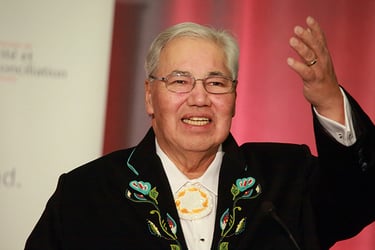 Murray Sinclair served as Co-Chair of the Aboriginal Justice Inquiry in Manitoba and as Chief Commissioner of the Truth and Reconciliation Commission (TRC). As head of the TRC, he participated in hundreds of hearings across Canada, culminating in the issuance of the TRC’s report, and associated 94 calls-to-action, in 2015. He was the first Indigenous judge appointed in Manitoba and the second Indigenous judge in Canada. He was appointed Senator by Prime Minister Justin Trudeau in 2016. Senator Murray Sinclair has received two Indspire Awards, is the sole double laureate, and in 2017, he was honoured with Indspire’s Lifetime Achievement Award.
Murray Sinclair served as Co-Chair of the Aboriginal Justice Inquiry in Manitoba and as Chief Commissioner of the Truth and Reconciliation Commission (TRC). As head of the TRC, he participated in hundreds of hearings across Canada, culminating in the issuance of the TRC’s report, and associated 94 calls-to-action, in 2015. He was the first Indigenous judge appointed in Manitoba and the second Indigenous judge in Canada. He was appointed Senator by Prime Minister Justin Trudeau in 2016. Senator Murray Sinclair has received two Indspire Awards, is the sole double laureate, and in 2017, he was honoured with Indspire’s Lifetime Achievement Award.
Harry Daniels will share with Louis Riel the honour of having introduced the rights of the Métis people in the Constitution of Canada: Riel in S. 31 of the Manitoba Act, 1870, and Harry in S. 35 of the Constitution Act of 1982.
Tom Longboat was a famous distance runner who forsook his lucrative running career to enlist as a dispatch carrier and ran messages and orders between units in WWI; was wounded twice and declared dead once. He returned to competitive running after the war and was made a Member of the Canadian Sports Hall of Fame.
Chief Dan George was an elected chief of the Tsleil-Waututh Nation, an esteemed actor, the first Indigenous person to be nominated for an Academy Award®, and a poet who used his notoriety to create a platform to speak about Indigenous issues. He delivered his famous “Lament for a Nation” to over 32,000 people in Vancouver’s Empire Stadium on July 1, 1967.
Kateri Tekakwitha was canonized on December 19, 2011, by Pope Benedict XVI who also authorized a decree approving a miracle (saving the life of a young boy suffering from a flesh-eating disease) attributed to Kateri.
Frank Calder was renowned for many barrier-busting achievements but he is arguably best known for the landmark Calder vs. Attorney General of BC as this is the decision that established for the first time that Aboriginal title exists in modern Canadian law. The Calder case was the foundation for the famous Nisga’a Treaty.
Delbert Guerin has been described as an inspiration, a visionary, a leader and a tireless warrior. He was all of these and more. His public persona will always be associated with his leadership role in the famous court case that bears his name Guerin v. The Queen, 1984 as it was the first Indigenous community to successfully sue the federal government.
Tanya Tagaq, O.C., is an Inuk throat singer from Cambridge Bay who has brought throat singing, albeit non-traditional throat singing, to the world stage. Her music is a unique crossover of classical, punk, rock and electronic influences with throat singing. The themes of her songs are often political. At the gala performance when her album Animism won the Polaris Prize in 2014, she projected the names of 1200 missing and murdered Indigenous women and included a defence of seal hunting, upon which her home community depends.
Thomas George Prince was the most decorated Indigenous veteran in Canadian history. He was awarded the Military Medal and the Silver Star at Buckingham Palace in 1945. Prince was one of 59 Canadians awarded the Silver Star and was one of only three of this group who were also Military Medal recipients. Sadly, his contributions to World War II, and later the Korean War, were only recognized posthumously in Canada.
Carey Price or "Price" is a professional hockey player with the Montreal Canadiens (#31). He is considered one of the best goaltenders in the world. He joined the Canadiens in 2007 as a backup goaltender but moved to starting goaltender later that season. He is the first goaltender in NHL history to win the Ted Lindsay, Jennings, Vezina and Hart trophies all in the same season. In 2007 he won a gold medal at the World Junior Ice Hockey Championships in Sweden. He was named to the Canadian Olympic Hockey Team and won a gold medal in the Sochi Winter Olympics; his contributions to that gold medal win earned him the tournament’s top goaltending award. In 2016 he won his first World Cup Of Hockey championship. In 2016, he was also the recipient of Indspire Award for Sports.
Pitseolak Ashoona, O.C., created between 7,000 and 8,000 prints and gained national and international respect for her work. An exhibition of her work was shown in three venues in Canada and, in collaboration with the Smithsonian Institution, was shown in five venues in the United States. Pitseolak Ashoona was inducted into the Royal Canadian Academy of Arts in 1974, and in 1977 she received the Order of Canada for her contribution to Canadian visual arts and heritage.
Richard Wagamese was a journalist and an author whose work reflected on the legacy of the residential school system and his childhood experiences as a second-generation residential school survivor. He began his writing career as a journalist in 1979 and in 1991, became the first Indigenous writer to win a National Newspaper Award for column writing. Many awards followed for both his columns and his books. His 1994 debut novel "Keeper'n Me'' earned him the Alberta Writers Guild Best Novel Award. "Indian Horse" was a finalist in CBC's Canada Reads in 2013 and is currently being adapted for a movie. For many Canadians, Richard Wagamese introduced Indigenous literature to their lives.
What little traditional knowledge there is on record about the Beothuk People is due to the offerings of Shanawdithit, the last remaining Beothuk. Shanawdithit, found starving in the bush, was placed in the care of William Cormack, a merchant philanthropist. Cormack encouraged Shanawdithit to record her knowledge of her people, her culture and her language. Shanawdithit died of tuberculosis on June 6, 1829. The drawings of this brave young woman form the foundation of our scanty knowledge of a culturally extinct People.
Arthur Manuel was an Indigenous leader and tireless rights advocate who first entered the world of Indigenous politics in the 1970s, as president of the Native Youth Association. He served as chief of the Neskonlith Indian Band, elected chair of the Shuswap Nation Tribal Council, and was also active in the Assembly of First Nations. He was instrumental in having Aboriginal constitutional rights enshrined in the Constitution Act 1982. He was recognized internationally, having advocated for Indigenous rights and struggles at the United Nations, The Hague and the World Trade Organization. He was co-author of Unsettling Canada: A National Wake Up Call, Between the Lines with Grand Chief Ron Derrickson.
Duncan McCue is the host of the CBC Radio One program Cross Country Checkup. Prior to taking this position in 2016, Duncan was a reporter for CBC News in Vancouver for over 15 years. His news and current affairs pieces were featured on CBC's flagship news show, The National. Among his many achievements, he was awarded a Knight Fellowship at Stanford University in 2011, where he created an online guide (riic.ca) for journalists called Reporting in Indigenous Communities. Mr. McCue received the 2017 Public Service award from Indspire.
“Christi Belcourt is a Michif (Métis) visual artist with a deep respect for Mother Earth, the traditions and the knowledge of her people. In addition to her paintings, she is also known as a community-based artist, environmentalist and advocate for the lands, waters and Indigenous peoples. She is currently a lead organizer for the Onaman Collective which focuses on the resurgence of language and land-based practices. She is also the lead coordinator for Walking With Our Sisters, a community-driven project that honours murdered or missing Indigenous women.” [2] Ms. Belcourt was selected to create a stained glass window for the Centre Block of Parliament to commemorate the legacy of Indian Residential School survivors and their families. Ms. Belcourt’s work is also an inspiration to the Italian fashion house of Valentino, which carried a line of haute couture designs based on one of her paintings.
“Norval Morrisseau is considered by many to be the Mishomis, or grandfather, of contemporary Indigenous art in Canada. His life has been sensationalized in newspapers and documentaries while his unique artistic style has pushed the boundaries of visual storytelling. The creator of the Woodland School of Art and a prominent member of the Indian Group of Seven, Morrisseau is best known for using bright colours and portraying traditional stories, spiritual themes, and political messages in his work.” [3]
“Ryan McMahon is a comedian, writer, media maker & community activator based out of Treaty #1 territory (Winnipeg, MB). Armed with a degree in Theatre & as a graduate of the prestigious Second City Conservatory (Toronto), Ryan’s comedic storytelling style is fast-paced, loose & irreverent as he explores the good, the bad & the ugly between Indian Country & the mainstream.” [4]
Anna Mae Pictou Aquash, from Nova Scotia, was a Mi'kmaq activist who became famous in the Native American rights movement. She was assassinated on American soil and the crime remains unsolved.
Beau Dick was a world-renowned Indigenous artist and Indigenous rights advocate who made significant contributions to family, friends, community, and the culture of the Kwakwaka’wakw. His contributions were immeasurable, his reputation immense, his humility legendary.
Sheila North-Wilson was elected Grand Chief of the Manitoba Keewatinowi Okimakanak (MKO) in 2015; she is the first woman to ever lead the MKO. Grand Chief Sheila North-Wilson is a former spokesperson for the Manitoba Assembly of First Nations, a journalist with CTV Winnipeg and was named by Chatelaine magazine in 2015 as one of its 30 women of the year. Grand Chief Sheila North-Wilson spoke in New York about the risks facing Indigenous women in Canada as they transition from rural reserves to urban settings at the 61st session of the Commission on the Status of Women at the United Nations.
Rita Joe, O.C., was a Mi'kmaq poet and songwriter. Her first book of poems The Poems of Rita Joe was published in 1978. She published seven books over her lifetime which earned her the unofficial title of “Poet Laureate of the Mi'kmaq People”. Her autobiographical Song of Rita Joe outlined some of her experiences as a residential school student. She received the Order of Canada in 1989, and was called to the Queen's Privy Council for Canada in 1992 - and one of the few non-politicians ever appointed. In 2017, Rita Joe was chosen by popular vote as the name for one of the new Halifax Transit ferries.
Cindy Blackstock, OC, FRSC, has a Bachelor of Arts, two Master's Degrees, and a Ph.D. She is the co-founder and Executive Director of the First Nations Child and Family Caring Society of Canada, a reconciliation-based organization. Her name is synonymous with Indigenous children’s rights. Between 2007 and 2016, she fought against the federal government for underfunding welfare services to Indigenous children living on reserve. The case was ultimately successful, and in 2016, the Canadian Human Rights Tribunal agreed with the complainants and ordered the federal government to compensate the affected children and their families. She is an articulate advocate whose work brought national attention to the extent of systemic discrimination endured by Indigenous children.
This article was updated on March 12, 2024.
[1] Alanis Obomsawin
[2] Christi Belcourt
[3] Norval Morrisseau Life & Work by Carmen Robertson
[4] Ryan McMahon Comedy
Featured photo: Tom Longboat. Photo: Canada's Sports Hall of Fame / Library and Archives Canada / PA-050294.
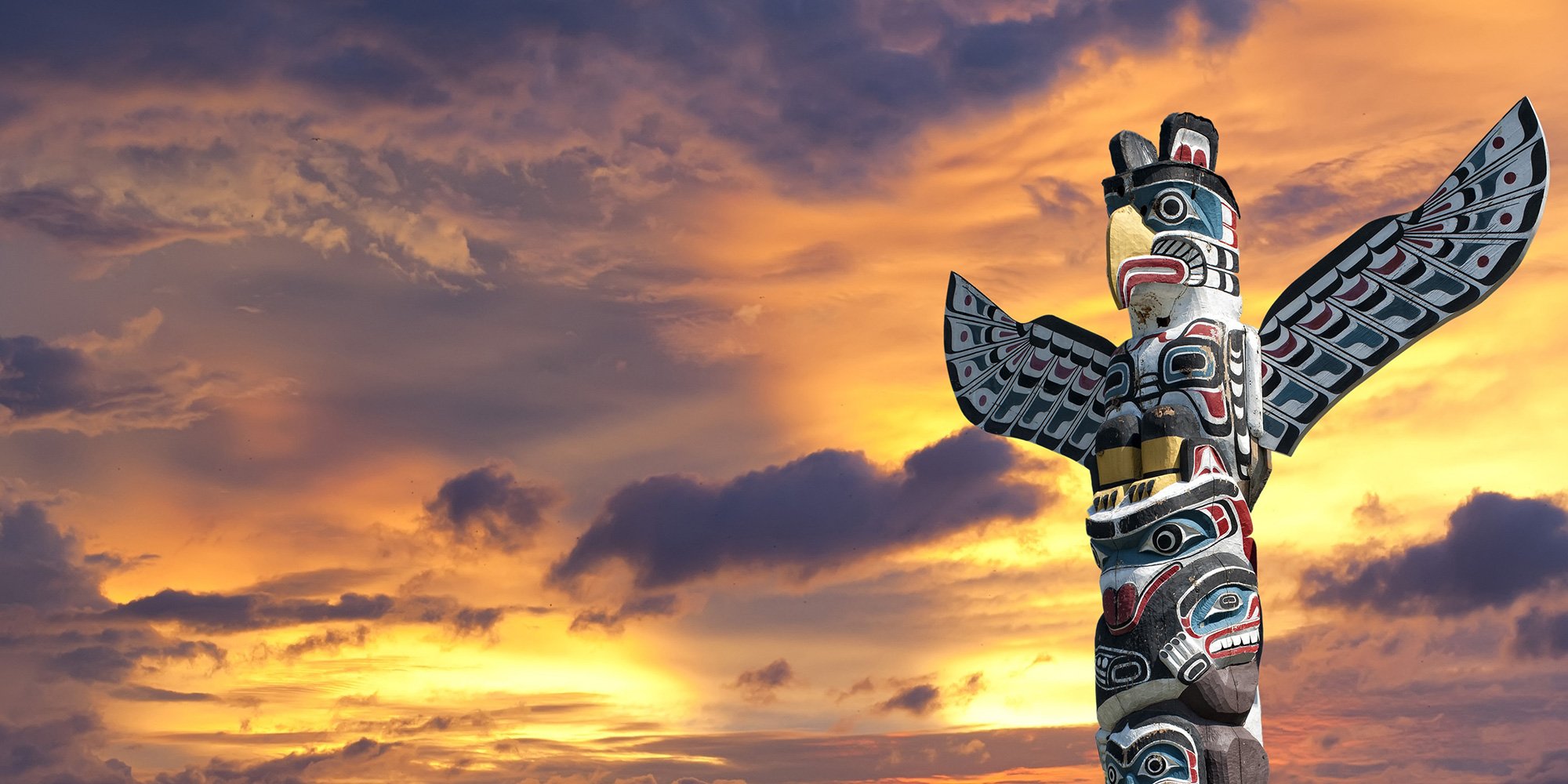
Every June 21st, thousands of Indigenous Peoples celebrate National Indigenous Peoples Day (NIPD). This is a special day to acknowledge the unique...
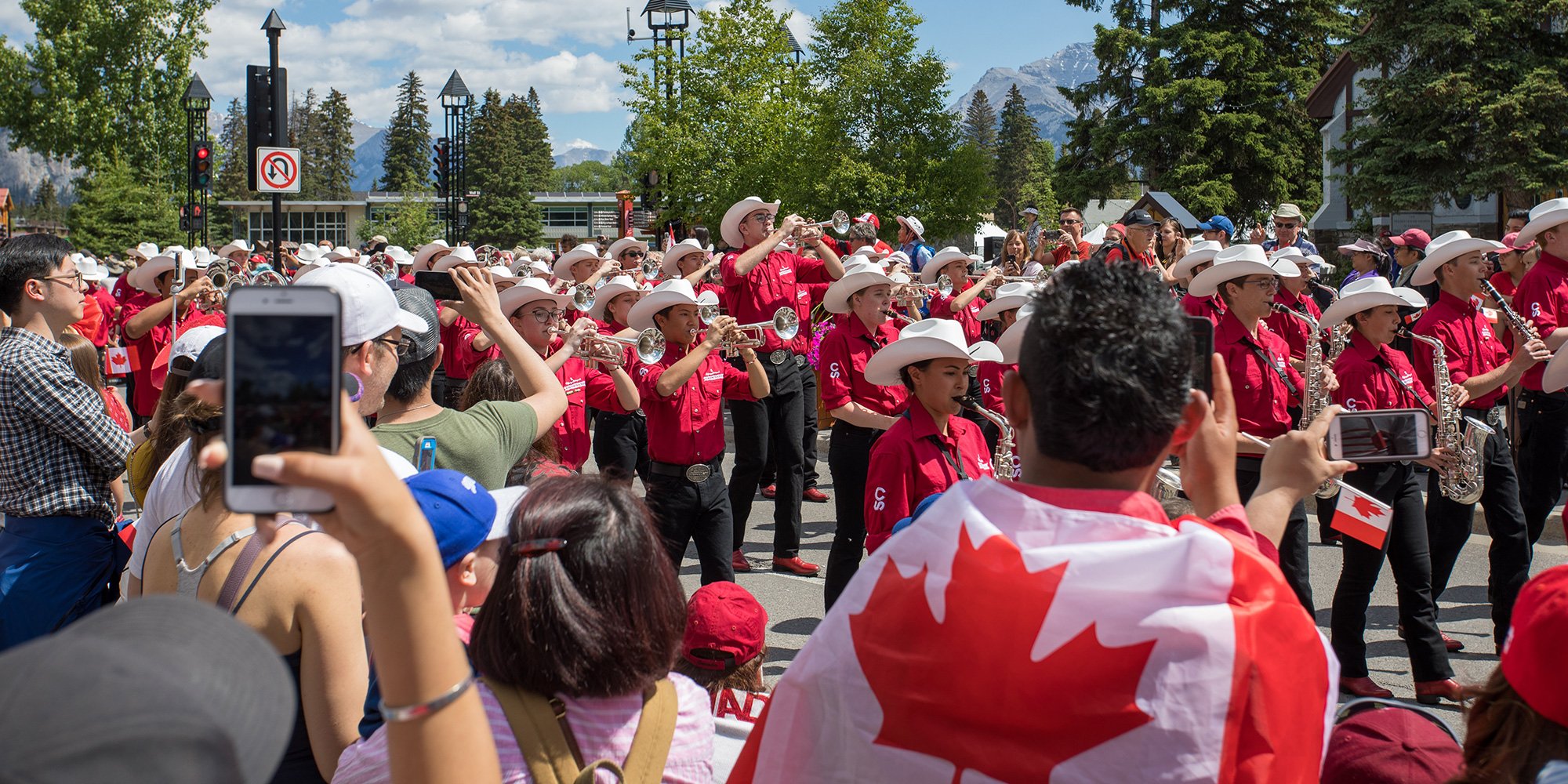
June is National Aboriginal History Month, and this year, the day after National Aboriginal History Month ends activities for Canada 150 begin....

We are in uncharted waters these days as countries around the world scramble to respond to the COVID-19 pandemic. While we are all at risk and all...